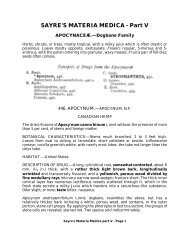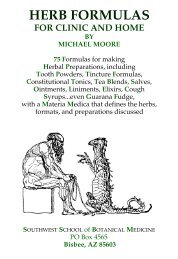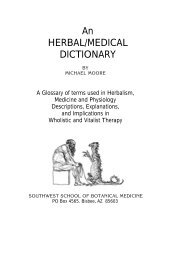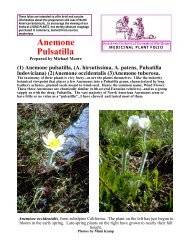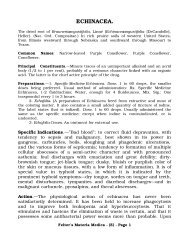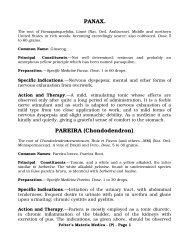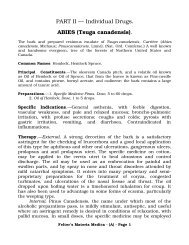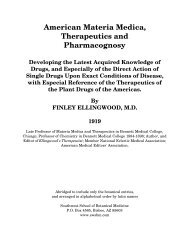SCARLET FEVER. Synonyms.—Scarlatina; Scarlet Rash. Definition ...
SCARLET FEVER. Synonyms.—Scarlatina; Scarlet Rash. Definition ...
SCARLET FEVER. Synonyms.—Scarlatina; Scarlet Rash. Definition ...
Create successful ePaper yourself
Turn your PDF publications into a flip-book with our unique Google optimized e-Paper software.
disease. The membrane disappears, the throat clears up, and yet our<br />
patient does not convalesce. There is a low, irregular fever, the pulse is<br />
small and feeble, the heart is poisoned by the toxins engendered, and<br />
the patient dies of heart-failure caused by septicemia; or, if recovery<br />
take place, weeks elapse before the patient's health is restored.<br />
What is true of this disease is sometimes observed in pneumonia,<br />
erysipelas, and others of a kindred type. Where the infection is due to<br />
toxins, the symptoms are of a very grave nature, typhoid in character,<br />
the tongue early showing evidence of sepsis. The secretion tells the same<br />
story, while the nervous system confirms the evidence of both. Death is<br />
usually the termination of this form, in from three to seven days.<br />
Diagnosis.—The history of the patient will assist materially in making<br />
our diagnosis. A retained placenta, a puerperal peritonitis, a tubercular<br />
ulcer, and kindred lesions, would shed much light on the case, while<br />
toxins from milk, ice-cream, cheese, canned goods, etc., would be equally<br />
plain, and local injuries could not wen be overlooked.<br />
Its more rapid development and less marked initial chill would enable<br />
one to differentiate it from pyemia. In the latter disease the fever is<br />
more irregular, chills and rigors recurring as in malarial fever. A<br />
jaundiced appearance of the skin is more pronounced in pyemia, and,<br />
while not constant, should have weight in recognizing the disease.<br />
Prognosis.—The prognosis will depend upon the character of the<br />
poison, the amount of infection, the ability of the system to remove the<br />
offending cause, and the skill with which we meet the septic processes<br />
by antagonistic remedies.<br />
If the offending cause can be removed before the system is thoroughly<br />
infected, the case will terminate favorably. Where there is great gastrointestinal<br />
irritation, the circulation rapid but weak, and when delirium<br />
appears early or coma becomes marked, the prognosis will be<br />
unfavorable.<br />
Treatment.—It seems hardly necessary to say that we must get rid of<br />
all sources of putrefaction that are still further poisoning the patient. If<br />
a pus tube be the offending organ, it should be removed or drainage<br />
established. If the uterus contain offending material, it should be<br />
emptied of all debris. Where there is a diseased endometrium, it should<br />
be thoroughly curetted, and, when necessary, this should be followed by<br />
The Eclectic Practice of Medicine - PART I - Infectious Diseases - Page 173



